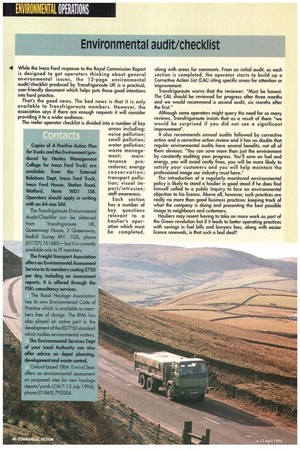Environmental audit/checklist
Page 42

If you've noticed an error in this article please click here to report it so we can fix it.
.41 While the Iveco Ford response to the Royal Commission Report is designed to get operators thinking about general environmental issues, the 12-page environmental audit/checklist produced by Transfrigoroute UK is a practical, user-friendly document which helps puts those good intentions into hard practice.
That's the good news. The bad news is that it is only available to Transfrigoroute members. However, the association says if there are enough requests it will consider providing it to a wider audience. The reefer operator checklist is divided into a number of key areas including: noise pollution; smell pollution; water pollution; waste manage ment; main tenance pro cedures; energy conservation; transport pollution; visual impact/intrusion; staff awareness.
Each section has a number of key questions relevant to a haulier's operation which must be completed, along with areas for comments. From an initial audit, as each section is completed, the operator starts to build up a Corrective Action List (CAL) citing specific areas for attention or improvement. Transfrigoroute warns that the reviewer: "Must be honest. The CAL should be reviewed for progress after three months and we would recommend a second audit, six months after the first."
Although some operators might query the need for so many reviews, Transfrigoroute insists that as a result of them "we would be surprised if you did not see a significant improvement". It also recommends annual audits followed by corrective action and a corrective action review and it has no doubts that regular environmental audits have several benefits, not all of them obvious: "You can save more than just the environment by constantly auditing your progress. You'll save on fuel and energy, you will avoid costly fines, you will be more likely to satisfy your customers and you will help maintain the professional image our industry must have." The introduction of a regularly monitored environmental policy is likely to stand a haulier in good stead if he does find himself called to a public inquiry to face an environmental objection to his licence. Above all, however, such practices are really no more than good business practices: keeping track of what the company is doing and presenting the best possible image to neighbours and customers. Hauliers may resent having to take on more work as part of the Green revolution but if it leads to better operating practices with savings in fuel bills and lawyers fees, along with easier licence renewals, is that such a bad deal?




























































































